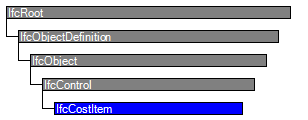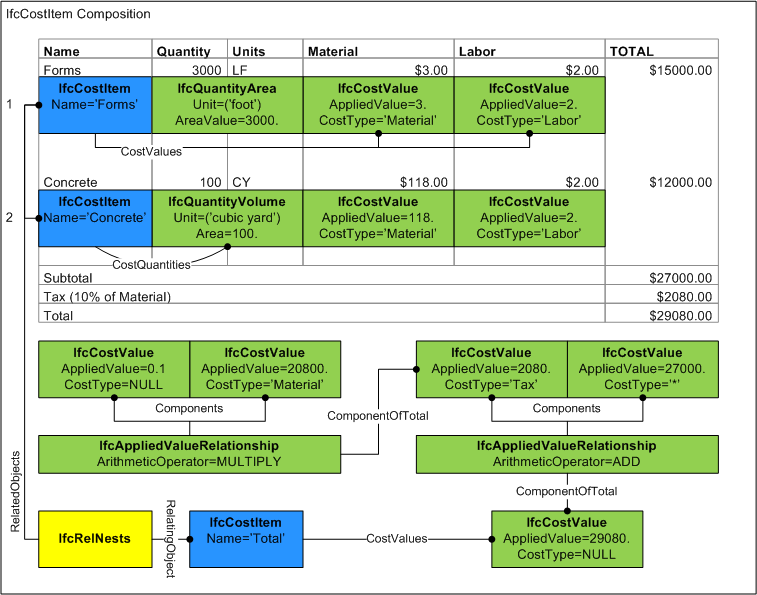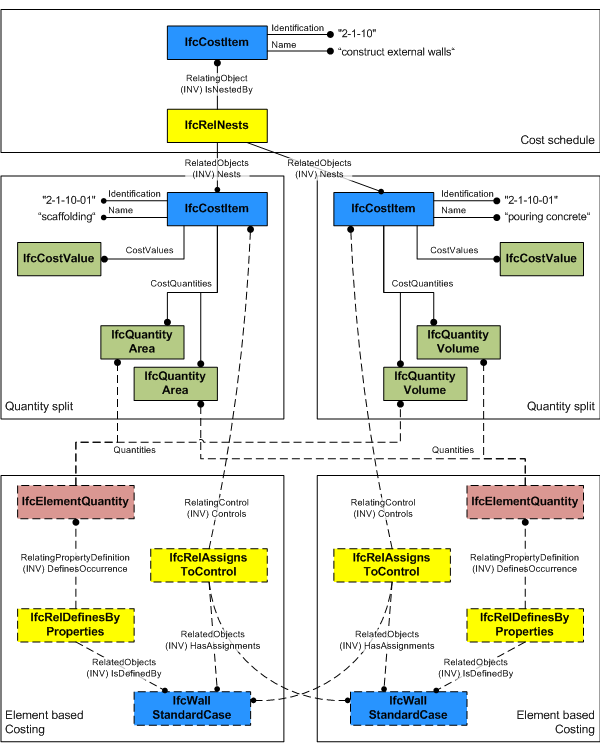Natural language names
 | Kostenelement |
 | Cost Item |
 | Item de coût |
Change log
| Item | SPF | XML | Change | Description | IFC2x3 to IFC4 4.0.0.0 |
|---|---|---|---|---|
| IfcCostItem | ||||
| OwnerHistory | MODIFIED | Instantiation changed to OPTIONAL. | ||
| Identification | ADDED | |||
| PredefinedType | ADDED | |||
| CostValues | ADDED | |||
| CostQuantities | ADDED |
Semantic definitions at the entity
Entity definition
An IfcCostItem describes a cost or financial value together with descriptive information that describes its context in a form that enables it to be used within a cost schedule. An IfcCostItem can be used to represent the cost of goods and services, the execution of works by a process, lifecycle cost and more.
Each instance of IfcCostItem may have a name and a description. Depending on the use for which the cost is intended, these values should be asserted on the basis of agreement. For instance, the Name attribute could be used to provide a common value that enables distinct instances to be brought together in a nesting arrangement (see below) while the Description attribute may be used to provide text used for item description in a costing schedule.
An IfcCostItem can link one or many IfcCostValue's representing a unit cost, total cost, or a unit cost with one or many quantities used to generate the total cost. The quantities can be given as individual quantities, or those quantities are provided as element quantities by one or many building elements. The IfcCostValue.CostType attribute indicates the category of cost, which may be used to present the value in a particular column. For nested cost items (having IfcRelNests relationship), IfcCostValue.CostType is significant such that IfcCostValue.AppliedValue is calculated as the sum of all nested costs having the same IfcCostValue.CostType or if set to an asterisk ('*'), then the sum of all nested costs of all cost types. An IfcCostValue may represent an original value or a value derived from formulas using IfcAppliedValueRelationship. For example, taxes may be calculated as a percentage of a subtotal.
HISTORY New entity in IFC2.0.
IFC4 CHANGE Attribute PredefinedType, CostValues, and CostQuantities added.
Attribute definitions
| # | Attribute | Type | Cardinality | Description | G |
|---|---|---|---|---|---|
| 7 | PredefinedType | IfcCostItemTypeEnum | ? |
Predefined generic type for a cost item that is specified in an enumeration. There may be a property set given specificly for the predefined types.
IFC4 CHANGE The attribute has been added. | X |
| 8 | CostValues | IfcCostValue | ? L[1:?] |
Component costs for which the total cost for the cost item is calculated, and then multiplied by the total CostQuantities if provided.
If CostQuantities is provided then values indicate unit costs, otherwise values indicate total costs.
For calculation purposes, the cost values may be directly added unless they have qualifications. Cost values with qualifications (e.g. IfcCostValue.ApplicableDate, IfcCostValue.FixedUntilDate) should be excluded from such calculation if they do not apply.
IFC4 CHANGE The attribute has been added. | X |
| 9 | CostQuantities | IfcPhysicalQuantity | ? L[1:?] |
Component quantities of the same type for which the total quantity for the cost item is calculated as the sum.
IFC4 CHANGE The attribute has been added. | X |
Inherited definitions from supertypes
Entity inheritance

Attribute inheritance
| # | Attribute | Type | Cardinality | Description | G |
|---|---|---|---|---|---|
| IfcRoot | |||||
| 1 | GlobalId | IfcGloballyUniqueId | Assignment of a globally unique identifier within the entire software world. | X | |
| 2 | OwnerHistory | IfcOwnerHistory | ? |
Assignment of the information about the current ownership of that object, including owning actor, application, local identification and information captured about the recent changes of the object,
NOTE only the last modification in stored - either as addition, deletion or modification. IFC4 CHANGE The attribute has been changed to be OPTIONAL. | X |
| 3 | Name | IfcLabel | ? | Optional name for use by the participating software systems or users. For some subtypes of IfcRoot the insertion of the Name attribute may be required. This would be enforced by a where rule. | X |
| 4 | Description | IfcText | ? | Optional description, provided for exchanging informative comments. | X |
| IfcObjectDefinition | |||||
| HasAssignments | IfcRelAssigns @RelatedObjects | S[0:?] | Reference to the relationship objects, that assign (by an association relationship) other subtypes of IfcObject to this object instance. Examples are the association to products, processes, controls, resources or groups. | X | |
| Nests | IfcRelNests @RelatedObjects | S[0:1] | References to the decomposition relationship being a nesting. It determines that this object definition is a part within an ordered whole/part decomposition relationship. An object occurrence or type can only be part of a single decomposition (to allow hierarchical strutures only).
IFC4 CHANGE The inverse attribute datatype has been added and separated from Decomposes defined at IfcObjectDefinition. | X | |
| IsNestedBy | IfcRelNests @RelatingObject | S[0:?] | References to the decomposition relationship being a nesting. It determines that this object definition is the whole within an ordered whole/part decomposition relationship. An object or object type can be nested by several other objects (occurrences or types).
IFC4 CHANGE The inverse attribute datatype has been added and separated from IsDecomposedBy defined at IfcObjectDefinition. | X | |
| HasContext | IfcRelDeclares @RelatedDefinitions | S[0:1] | References to the context providing context information such as project unit or representation context. It should only be asserted for the uppermost non-spatial object.
IFC4 CHANGE The inverse attribute datatype has been added. | X | |
| IsDecomposedBy | IfcRelAggregates @RelatingObject | S[0:?] | References to the decomposition relationship being an aggregation. It determines that this object definition is whole within an unordered whole/part decomposition relationship. An object definitions can be aggregated by several other objects (occurrences or parts).
IFC4 CHANGE The inverse attribute datatype has been changed from the supertype IfcRelDecomposes to subtype IfcRelAggregates. | X | |
| Decomposes | IfcRelAggregates @RelatedObjects | S[0:1] | References to the decomposition relationship being an aggregation. It determines that this object definition is a part within an unordered whole/part decomposition relationship. An object definitions can only be part of a single decomposition (to allow hierarchical strutures only).
IFC4 CHANGE The inverse attribute datatype has been changed from the supertype IfcRelDecomposes to subtype IfcRelAggregates. | X | |
| HasAssociations | IfcRelAssociates @RelatedObjects | S[0:?] | Reference to the relationship objects, that associates external references or other resource definitions to the object.. Examples are the association to library, documentation or classification. | X | |
| IfcObject | |||||
| 5 | ObjectType | IfcLabel | ? | The type denotes a particular type that indicates the object further. The use has to be established at the level of instantiable subtypes. In particular it holds the user defined type, if the enumeration of the attribute PredefinedType is set to USERDEFINED. | X |
| IsDeclaredBy | IfcRelDefinesByObject @RelatedObjects | S[0:1] | Link to the relationship object pointing to the declaring object that provides the object definitions for this object occurrence. The declaring object has to be part of an object type decomposition. The associated IfcObject, or its subtypes, contains the specific information (as part of a type, or style, definition), that is common to all reflected instances of the declaring IfcObject, or its subtypes.
IFC4 CHANGE New inverse relationship, change made with upward compatibility for file based exchange. | X | |
| Declares | IfcRelDefinesByObject @RelatingObject | S[0:?] | Link to the relationship object pointing to the reflected object(s) that receives the object definitions. The reflected object has to be part of an object occurrence decomposition. The associated IfcObject, or its subtypes, provides the specific information (as part of a type, or style, definition), that is common to all reflected instances of the declaring IfcObject, or its subtypes.
IFC4 CHANGE New inverse relationship, change made with upward compatibility for file based exchange. | X | |
| IsTypedBy | IfcRelDefinesByType @RelatedObjects | S[0:1] | Set of relationships to the object type that provides the type definitions for this object occurrence. The then associated IfcTypeObject, or its subtypes, contains the specific information (or type, or style), that is common to all instances of IfcObject, or its subtypes, referring to the same type.
IFC4 CHANGE New inverse relationship, the link to IfcRelDefinesByType had previously be included in the inverse relationship IfcRelDefines. Change made with upward compatibility for file based exchange. | X | |
| IsDefinedBy | IfcRelDefinesByProperties @RelatedObjects | S[0:?] | Set of relationships to property set definitions attached to this object. Those statically or dynamically defined properties contain alphanumeric information content that further defines the object.
IFC4 CHANGE The data type has been changed from IfcRelDefines to IfcRelDefinesByProperties with upward compatibility for file based exchange. | X | |
| IfcControl | |||||
| 6 | Identification | IfcIdentifier | ? |
An identifying designation given to a control
It is the identifier at the occurrence level.
IFC4 CHANGE Attribute unified by promoting from various subtypes of IfcControl. | X |
| Controls | IfcRelAssignsToControl @RelatingControl | S[0:?] | Reference to the relationship that associates the control to the object(s) being controlled. | X | |
| IfcCostItem | |||||
| 7 | PredefinedType | IfcCostItemTypeEnum | ? |
Predefined generic type for a cost item that is specified in an enumeration. There may be a property set given specificly for the predefined types.
IFC4 CHANGE The attribute has been added. | X |
| 8 | CostValues | IfcCostValue | ? L[1:?] |
Component costs for which the total cost for the cost item is calculated, and then multiplied by the total CostQuantities if provided.
If CostQuantities is provided then values indicate unit costs, otherwise values indicate total costs.
For calculation purposes, the cost values may be directly added unless they have qualifications. Cost values with qualifications (e.g. IfcCostValue.ApplicableDate, IfcCostValue.FixedUntilDate) should be excluded from such calculation if they do not apply.
IFC4 CHANGE The attribute has been added. | X |
| 9 | CostQuantities | IfcPhysicalQuantity | ? L[1:?] |
Component quantities of the same type for which the total quantity for the cost item is calculated as the sum.
IFC4 CHANGE The attribute has been added. | X |
Definitions applying to General Usage
IfcCostItem
Concept usage
Classification
The Classification Association concept applies to this entity.
Instances of IfcCostItem are used for cost estimates, budgets, and other forms, where a variety of identification codes are used extensively to identify the meaning of the cost. Examples include project phase codes, CSI codes, takeoff sequence numbers, and cost accounts. The model allows for all classes that are ultimately subtypes of IfcObject to inherit the ability to have one or more instances of IfcClassificationReference to be assigned. Where identification codes are required, the generic IfcRelAssociatesClassification facility should be used.
Nesting
The Object Nesting concept template applies to this entity as shown in Table 324.
| ||
Table 324 — IfcCostItem Object Nesting |
An IfcCostItem can nest other instances of IfcCostItem through its relationships to IfcRelNests. This can be used to enable the development of complex groups of costs as may be found in cost schedules through to pages, sections and complete cost schedules.
There is always a summary cost item as the root item of the tree representing the cost item nesting. Subsequent instances of IfcCostItem are assigned to the summary cost item using IfcRelNests. The summary cost item itself is assigned to IfcCostSchedule through the IfcRelAssignsToControl relationship.
Figure 408 illustrates a cost item composition used for a cost schedule. Each line item has a quantity and separate unit costs where IfcCostValue.CostType indicates the category of cost. The summary item has a hierarchy of costs calculated according to IfcAppliedValueRelationship.ArithmeticOperator, where IfcCostValue.CostType identifies the category to be totalled. The Tax component has IfcCostValue.CostType set to 'Material' which indicates it is the sum of all nested values of the 'Material' category ($3 x 3000 + $118 x 100 = $20800). The Subtotal component has IfcCostValue.CostType set to an asterisk ('*') which indicates it is the sum of all nested values of all categories.
 |
Figure 408 — Cost composition |
Control Assignment
The Control Assignment concept template applies to this entity as shown in Table 325.
| ||||||||||||||
Table 325 — IfcCostItem Control Assignment |
An IfcCostItem can be calculated based on quantities from objects through its relationship to IfcRelAssignsToControl.
For quantity-based costing, IfcElement, IfcTask, or IfcResource occurrence subtypes may be used. Multiple elements may be assigned of the same or different types, using IfcPhysicalQuantity entities defined at each object. Each IfcPhysicalQuantity type must be identical (for example, all values are IfcAreaQuantity) such that they can be added together.
For rate-based costing (specifically for IfcCostScheduleTypeEnum.SCHEDULEOFRATES), a single IfcTypeProduct, IfcTypeProcess, or IfcTypeResource subtype may be used to reflect rates for occurrences of such types. This enables the possibility to generate a quantity-based cost schedule for occurrences based on types with rate-based cost schedules.
IfcRelAssignsToControl is also used in the opposite direction to link the root IfcCostItem to an IfcCostSchedule where RelatingControl is the IfcCostSchedule.
Figure 409 illustrates cost item assignment derived from building elements. The IfcRelAssignsToControl relationship indicates building elements for which quantities are derived. Not shown, costs may also be derived from building elements by traversing assignment relationships from the assigned IfcProduct to IfcProcess to IfcResource, where all costs ultimately originate at resources. It is also possible for cost items to have assignments from processes or resources directly.
 |
Figure 409 — Cost assignment |
mvdXML Specification
<?xml version="1.0" encoding="utf-8"?>
<ConceptRoot xmlns:xsi="http://www.w3.org/2001/XMLSchema-instance" uuid="5a2f1385-7384-4ec6-9469-58947f9d36b5" name="IfcCostItem" applicableRootEntity="IfcCostItem">
<Applicability>
<Template ref="763c62a9-3055-4a39-89b7-0569660ffe0b" />
<TemplateRules operator="and">
</TemplateRules>
</Applicability>
<Concepts>
<Concept uuid="34af1c2c-7192-4662-840b-7cedd9b33c5d" name="Classification">
<Template ref="4a224609-6578-4c75-afcf-8affa86e5ef2" />
</Concept>
<Concept uuid="37f27019-7c4e-4dbc-943c-60a4bc30628b" name="Nesting">
<Template ref="38ca8788-5e47-411c-8294-d56f9e9a5691" />
<TemplateRules operator="and">
<TemplateRule Parameters="Type[Type]='IfcCostItem'" />
</TemplateRules>
</Concept>
<Concept uuid="60a487ed-b0b3-4218-8fbf-6e78ff497e8e" name="Control Assignment">
<Template ref="813e73fe-5641-4648-a680-8887cf4359f1" />
<TemplateRules operator="and">
<TemplateRule Description="For quantity-based costs based on product occurrences, spatial structures, or other physical artifacts." Parameters="Type[Type]='IfcProduct'" />
<TemplateRule Description="For quantity-based costs based on tasks, procedures, or events." Parameters="Type[Type]='IfcProcess'" />
<TemplateRule Description="For quantity-based costs based on resource allocations." Parameters="Type[Type]='IfcResource'" />
<TemplateRule Description="For cost rates based on product models." Parameters="Type[Type]='IfcTypeProduct'" />
<TemplateRule Description="For cost rates based on process models of historical or projected duration." Parameters="Type[Type]='IfcTypeProcess'" />
<TemplateRule Description="For cost rates based on resource models of historical or projected productivity." Parameters="Type[Type]='IfcTypeResource'" />
</TemplateRules>
</Concept>
</Concepts>
</ConceptRoot>
Concept inheritance
| # | Concept | Template | Model View |
|---|---|---|---|
| IfcRoot | |||
| Identity | Software Identity | General Usage | |
| Revision Control | Revision Control | General Usage | |
| IfcObjectDefinition | |||
| Assignment to Product | Assignment to Product | General Usage | |
| IfcObject | |||
| Object User Identity | Object User Identity | General Usage | |
| Object Predefined Type | Object Predefined Type | General Usage | |
| Object Typing | Object Typing | General Usage | |
| Property Sets for Objects | Property Sets for Objects | General Usage | |
| Property Sets with Override | Property Sets with Override | General Usage | |
| IfcCostItem | |||
| Classification | Classification Association | General Usage | |
| Nesting | Object Nesting | General Usage | |
| Control Assignment | Control Assignment | General Usage | |
Formal representations
XML Specification
<xs:element name="IfcCostItem" type="ifc:IfcCostItem" substitutionGroup="ifc:IfcControl" nillable="true"/>
<xs:complexType name="IfcCostItem">
<xs:complexContent>
<xs:extension base="ifc:IfcControl">
<xs:sequence>
<xs:element name="CostValues" nillable="true" minOccurs="0">
<xs:complexType>
<xs:sequence>
<xs:element ref="ifc:IfcCostValue" maxOccurs="unbounded"/>
</xs:sequence>
<xs:attribute ref="ifc:itemType" fixed="ifc:IfcCostValue"/>
<xs:attribute ref="ifc:cType" fixed="list"/>
<xs:attribute ref="ifc:arraySize" use="optional"/>
</xs:complexType>
</xs:element>
<xs:element name="CostQuantities" nillable="true" minOccurs="0">
<xs:complexType>
<xs:sequence>
<xs:element ref="ifc:IfcPhysicalQuantity" maxOccurs="unbounded"/>
</xs:sequence>
<xs:attribute ref="ifc:itemType" fixed="ifc:IfcPhysicalQuantity"/>
<xs:attribute ref="ifc:cType" fixed="list"/>
<xs:attribute ref="ifc:arraySize" use="optional"/>
</xs:complexType>
</xs:element>
</xs:sequence>
<xs:attribute name="PredefinedType" type="ifc:IfcCostItemTypeEnum" use="optional"/>
</xs:extension>
</xs:complexContent>
</xs:complexType>
EXPRESS Specification
ENTITY IfcCostItem
SUBTYPE OF (IfcControl);
PredefinedType : OPTIONAL IfcCostItemTypeEnum;
CostValues : OPTIONAL LIST [1:?] OF IfcCostValue;
CostQuantities : OPTIONAL LIST [1:?] OF IfcPhysicalQuantity;
END_ENTITY;

 Instance diagram
Instance diagram Link to this page
Link to this page